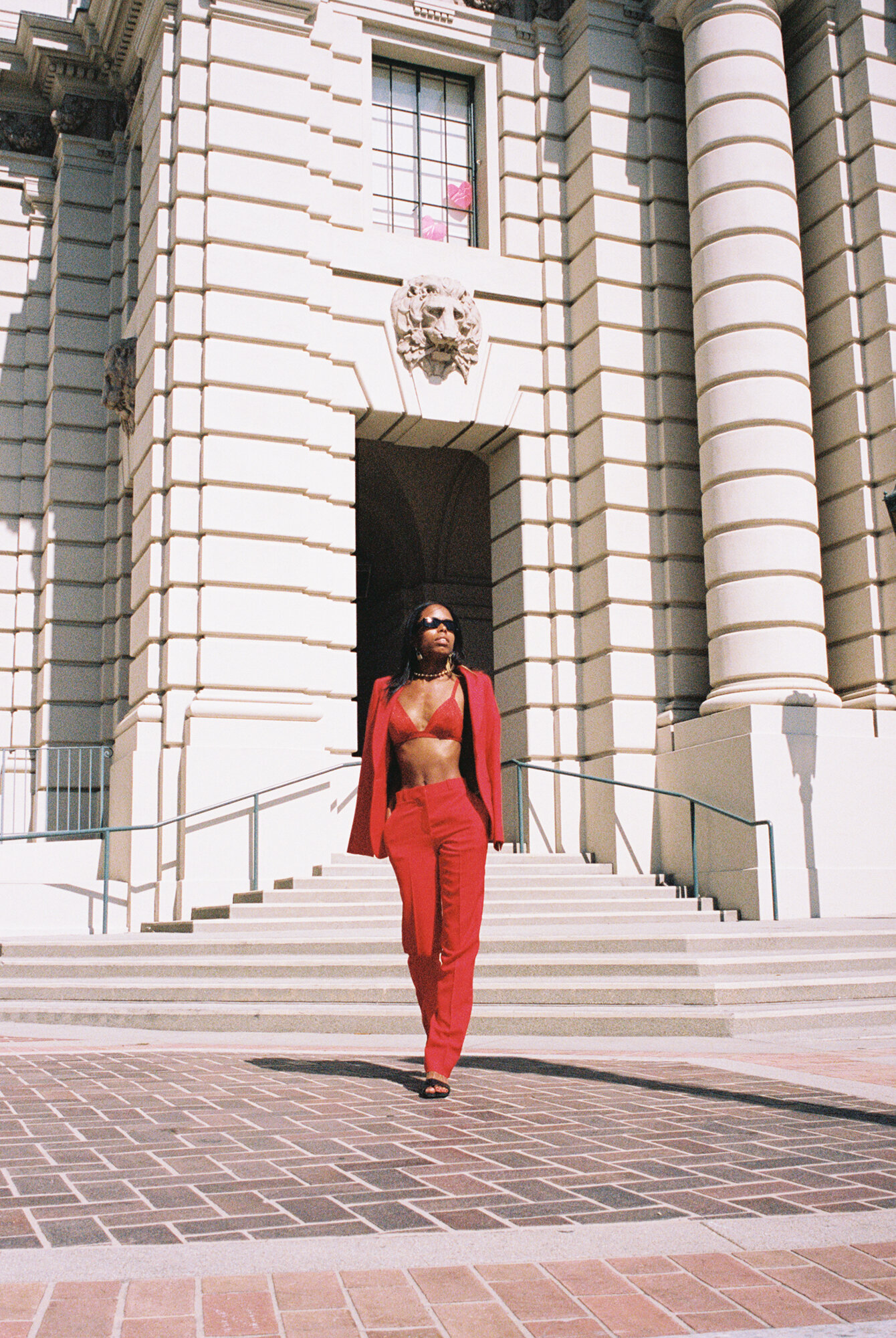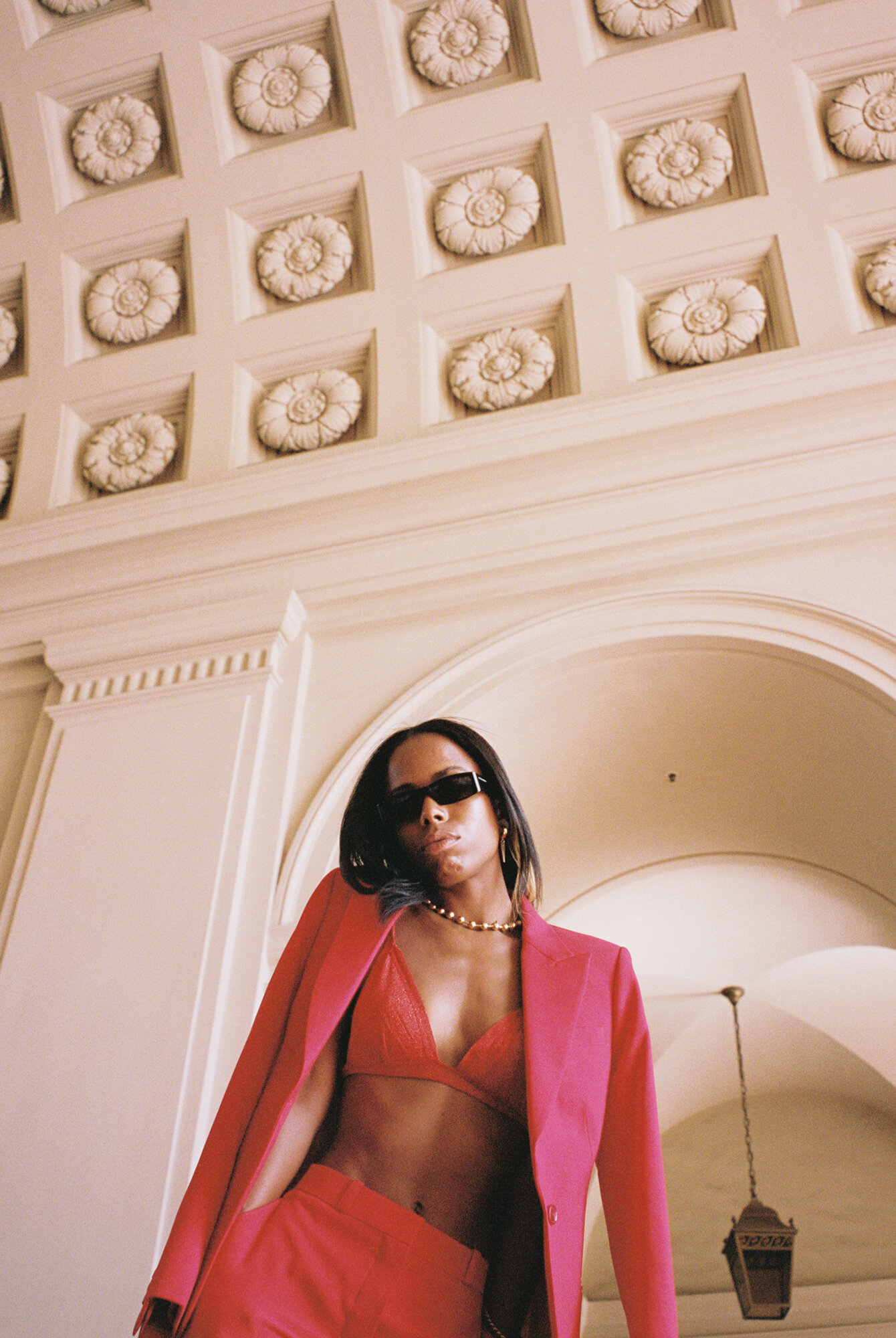Danielle DeGrasse-Alston, Creative Director
Interview by Bridget Botchway
Photos by Dana Boulos
Danielle Degrasse-Alston is a multi-hyphenate creative, rooted in faith and her community. She embodies the 'new professional': raw intelligence and a sort of calculated risk taker. Her biggest bet? Herself. Any regrets? None.
What are some of the ways you identify yourself in the creative world? How do you introduce or explain what you do to others?
I’ve been kinda trying to figure out that title as well. I am a director, a photographer and people come to me as a creative director too. I’ve done interior design, built decks for campaigns, and pitched ideas for advertising campaigns so I get a lot of people coming to me for this well-rounded experience. Which tells me that I not only have the eye aesthetically but I also have the forethought to understand what people want [now] or what they want in the future. I would say creative director is my title.
Can you tell us what led you to the creative director realm? Have you always worked in the photo and video field?
So, I can give you a little bit of background. After high school I deferred my first year to study abroad in Spain for a semester and when I got back I was going to go to community college for a year back in Chicago and then I started dating Rodney (Danielle’s high school sweetheart) again, he was doing music so I did music videos for him. On top of that, I was doing music videos for Vic [Mensa] and Chance [the Rapper] so I got exposed to this idea of how I could position myself as a creative. I didn't know what jobs were available as a photographer. I didn't understand that until I came back to Chicago.
Did you finish school in Chicago?
I went to Boston University to study finance because that to me was the goal. I thought that’s the smart way to make money, that’s what I'm going to do. Instead of going to Boston University, I transferred to Columbia College Chicago, which is the school that Rodney went to and then Rodney passed away three days before I was supposed to start school. I said “I can’t be in school; I can’t be in Chicago” It was too hard for me. So I went back to Boston to study finance, I went there for a semester and it was totally the wrong thing, I felt it in my soul. I dropped out and I went back to Chicago, continued at Columbia and I continued really making my mark with Vic and we did music videos for Savemoney and I started making money that way for a couple years.
You are an independent artist now but you started in the Ad world, how did you walk away from that comfy lifestyle?
Yes, I got offered a internship at Leo Burnett. I worked there as a junior art director intern. It was fascinating to see art on a profitable level but at the same time the company didn't compare to the experience I had running around shooting music videos with my friends. They offered me a job at the end of my internship but I said “I'm sorry I can’t work in this big corporate industry”, knowing I haven't fulfilled my own work, shooting music videos, etc. So, I didn't take the job although I valued the experience.
Why did you leave Chicago?
I got approached by Nike...
Wait, sorry to interrupt, how was that experience?
Nike was actually exciting because I could be a creative individual and get massive exposure but I realized that you don't have any protection. I did video shoots for them and I came to them with an event idea series and they loved the idea although nothing followed through and then three months later I saw them do the idea on their own. But, that told me that I clearly have the brains and creativity to work with these brands but not the protection.
Back to why you left Chicago...
Nike has a huge presence in Chicago so working with them felt like the top tier thing to do. So, when I couldn't breakthrough to the top, I needed to leave Chicago. Chicago is a commercial city. If you going to be there and be an artist who gets paid you'll be working for brands like Kellogg's, Johnson&Johnson, McDonald’s and they aren't going to get too creative. Nike will get creative but when they took my idea, I felt trapped. Making music videos is great but you don't make money; ad life great but not fulfilling. I had this middle ground with Nike but I was naive.
As a new director and photographer, how did you start in LA?
In LA, I did lots of freelance work, I worked more on the bridge between agency and consumer and pitching more ideas like that. Really, the first year, I just wanted to make money. The second year I realized that, okay I've got the money thing down where I'm comfortable. Now, how do I get back into this, inspiring people on a grand level.
Is that your underlining motive with all the work you are making?
Yes! It’s to tell a story, my story, because I know my story holds weight. That’s why Nike approached me. That's why Leo [Burnett] offered me a job without a college degree. That’s what Rodney had been telling me all this time. I have a story I just never had access.
Can you tell me more about your work with Lil Yachty?
The first year, in LA, I PA'ed on a music video set for Lil Yachty because my friend is a commissioner at Capitol Records. So I was on set for like $200 and he told me to bring my camera. I took pictures and nothing happened.
Then, they were doing another Lil Yachty shoot and I took pictures, this time, I took a lot of photos (on film) and this time Yachty wants to see the pictures. I'm like “Fuck Yeah!” So, I get all the pics developed, Yachty is releasing an album the next day and he uses all my pictures to promote his album and tags me. My fee went to 750 instead of 200. That was the moment, I was like, “I should flip this” from the PA job into the photography job. Since then, Kevin [the commissioner] has really been a catalyst in my life and career. Since then, he's hired me for every shoot. Lil Yachty, Migos, Troye Sivan, which led me to Ariana Grande pics, and so many more. So that’s where I got the opportunity and then my skill took me to the next level.
As a black woman, who advocates for black lives, but also creates works with the huge brands we are demanding justice from, how do you find balance, a common ground?
My philosophy is: we stood up, we told them what’s wrong, they know what’s wrong. Now we gotta take the select few oppressors and white people that are willing to listen and work side-by-side with them because we live side-by-side with them, work side-by-side with them, interact with them everyday. So, for us to think that we are different and can’t come together, it’s not realistic or effective. We have to find a common ground where we can live peacefully together and that starts with media and advertising. So this position between the people and the people who make it, is really important because you have to translate back and forth between the two.
What are your thoughts on the performative allyship displayed by some of these huge brands?
If a company hits me up and I know they put ‘POC preferred’ at the end of their decks I know it can be offensive to some people and it’s awkward. But I don't mind, I'm like yes! Now, I don't support companies who say they will do something and don't do anything. That’s ridiculous. I'm going to let God handle that because that is unethical and inefficient. New York and Los Angeles are microcosms of what this whole world will look like in 100 years. They are the most progressive cities in the country. If you can't get behind diversity, you won't make it.






